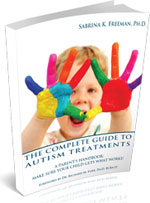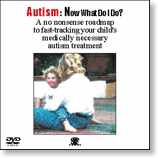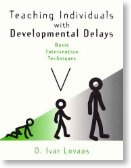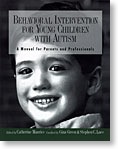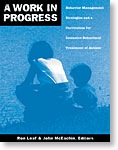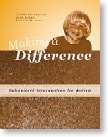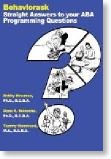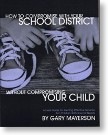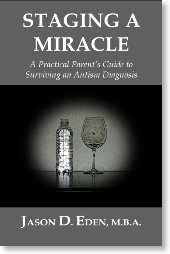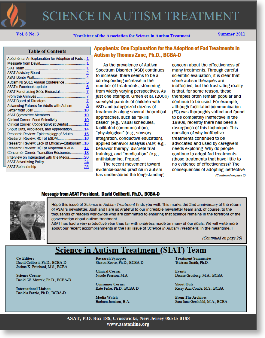You know the education system is a disaster when parents SHUN mainstreaming
Unfortunately, based on past performance, I fear that these children with autism are going to be forced into a system that is probably set up for failure. The children, their parents, and the typically developing peers will be exposed to the worst of experiences rather than the best.
Once again, it is not mainstreaming that is the problem; rather, it is incompetence write large.
When researchers are duped by policy wonks
In the same way as Cancer researchers do not routinely recommend denial or rationing of treatment based on the progression of the Cancer, neither should autism researchers predict the efficacy of treatment for hypothetical children based on their limited studies regarding the effectiveness of treatment after a discrete amount of time. The moment these researchers dive into the murky waters of prediction of an individual child based on their research, they have become advocates instead of researchers. They have in a brief moment moored from pure researchers into policy wonks.
What am I talking about? I’m referring to the rich history of denial of services based on researcher testimony.
Since when did "cure" become the standard for funding treatment?
The Times’ argument goes something like this:
Researchers have established that the therapy can improve behavior, language and intelligence test scores. But no scientist using the gold standards of medical research has reproduced the success rate reported by Lovaas.
First of all, this type of thinking shows a complete lack of understanding regarding science. The replications of Lovaas’ work done by researchers around the world demonstrate, unequivocally, that in every single well-designed study the experimental group benefit tremendously as opposed to the control group.
Second, the LA Times disparagingly describes how hope of “recovery” is a powerful motivator and a valuable marketing tool for companies that provide ABA services. So what! Every medical center advertises based on the goal of prospective recovery from a given disease!
What is relevant is the fact that thousands of children have benefitted and continue to benefit from effective behavioral treatment each and every day. These gains are supported by data! Based on this article, it is clear that the LA Times thinks children with autism are children of a lesser God.
How else can we describe the complete double standard when it comes to autism. Only where autism is concerned, does “recovery” mean success and substantial improvement mean failure! If we were to exchange the word autism with cancer, a treatment that prolongs someone’s life perhaps 2 or 3 years would be considered a success, even though the person ultimately passes away. Yet with autism, substantively improving the child’s condition, possibly enabling a life with dignity for their 85 years, is considered failure and not worth the money!
What is really going on becomes quite clear at the end of the Times article to those in the autism field. The researcher, Sally Rogers, who is known for a competing treatment that lacks the evidence of ABA, states:
If all our interventions are based on one-to-one therapy for vast hours”..., “very few children are going to get their needs met.”
And there you have the pernicious crux of the Times-endorsed reasoning: if the best -- and singularly proven -- autism treatment is too costly and time consuming, then it should not be recommended systemically. If every child can’t receive the treatment, no child should. This is worse than rationing treatment. This is actually denying the most effective treatment for autism! It is anti-intellectual and anti-science and has no place in the debate!
Instead of this researcher supporting the fight to force health care providers to cover medically necessary autism treatment, she essentially argues that most children should be sacrificed insofar as vast hours of one-to-one therapy are deemed to be impractical for the “greater good” of most children. Bunk! I suggest that if she is so pessimistic about our children’s right to treatment for their core health need, she needs to find a field where she will be better able to contribute, rather than remain a researcher who argues for limiting treatments that work and pushing treatments that don’t.
An early diagnosis with no access to treatment is immoral
Dr. Klin discusses research which has resulted in the ability to identify autism reliably at six months of age, prior to the age where behaviors characteristic of autism typically begin to appear. Where he garnered my respect was when he said that an early diagnosis is useless if parents do not have access to effective treatment for their children. This seems like an obvious point but it is often overlooked by many professionals and particularly policy makers.
We parents have been saying this for the last 20 years! Put simply, early diagnosis without access to treatment is immoral. Substitute autism with leukemia and everyone understands that a diagnosis without access to treatment is cruelty. Finally, we have an academic who makes it very clear that autism treatment and early diagnosis combine as a moral issue. When speaking about early diagnosis, Klin says, “But this [early diagnosis] would be immoral if we didn’t also have an infrastructure for intervention, for treatment.”
Thank you, Dr. Klin, for boldly speaking the obvious and advocating for access to necessary autism treatment. Hopefully, we will hear more from Dr. Klin in the future!
When Speech Recognition Technology Meets Autism
Over the years, I’ve gone to countless autism related conferences and I’ve asked the same question: How do I improve my child’s prosody? I’ve never gotten a good answer. I’ve researched it myself and have not found any compelling research in this area.
Meanwhile, the private sector keeps innovating, particularly in affordable computer technology.
I took a relatively low-cost chance and bought Rosetta Stone (English) for my child with autism because they have a learning section on prosody. She has been working with this speech recognition program for a couple of years, on and off. I have observed, purely anecdotally, that a program designed to teach a second language may be improving her prosody. The question is, can this be true? If we can use “off-the-shelf” language programs and apply them to autism with some success, think of the potential! I think I may be seeing good results; however, without a controlled study, I’m not certain, from a scientific standpoint.
Any graduate students out there looking for a thesis topic?
Parents should not endure severe autism unaided
Every time I read one of these posts, I can’t help but think: why are these parents doing this by themselves? Why is there no professional involved in setting up a treatment program for their child? If there is a bona fide autism professional involved, why is horribly egregious behavior still happening?
The science of behavioral treatment has come a long way and there are professionals who are qualified to eliminate anti-social behaviors and encourage pro-social behaviors. If the issue is money, which it often is, these parents would be wise to see that what monies are available can possibly be redirected toward a behavioral treatment consultant who can set up a treatment program to extinguish maladaptive behaviors.
We all know that government programs set up to help are usually a huge pain to navigate. It’s exhausting and frustrating to advocate for one’s child in a mindless bureaucratic system. However, if the child is truly out of control and is aggressing toward the parent, it’s only a matter of time until the system inherits responsibility for that child. Therefore, it’s in the best interest of “the system” (i.e., less expensive) to support the child at home. If the parent can bring this message across successfully, the system will probably find monies to divert to the proposed in-home behavioral treatment program. If the parent cannot do this on his/her own, perhaps a local advocate or attorney can assist in bringing the cost-benefit argument across persuasively to government officials.
It is truly outrageous that families of severely autistic children suffer in this way, especially when there is a viable alternative a phone call away.
Hopeless Special Education can't be fixed with "dispute resolution"
But apparently we’re a very litigious bunch, insofar as parents of children with autism file more lawsuits than parents of other children with special needs; I’m sure this comes as no surprise to the thousands of parents who endlessly fight for their children’s access to an appropriate education!
The interesting statistic in this study is that court decisions regarding children with autism account for almost one third of the litigation under this section in the Individuals With Disabilities Education Act (IDEA).
Predictably, the special education system does not like to waste money defending itself against a tsunami of autism related lawsuits. The authors suggest, “Special education leaders need to pay particular attention to establishing effective communications and trust building with parents of students with autism and to optimize the use of various approaches of alternative dispute resolution.”
Allow me to translate. The authors do not suggest that special educators should do the right thing for children with autism and follow the law, which requires inclusion and mainstreaming whenever possible; rather, they suggest that educators manipulate the parents to “trust” the professionals. If there is a problem, they should steer the parents away from going to court by deflecting substantive matters such as a systemic lack of medically necessary autism treatment, and instead focus on better “dispute resolution” and “trust building.”
It’s amazing how loyal parents of children with autism are when someone in the system actually looks out for their child and his future! The good special educators need power to advocate for the child in the system. The law, and the litigious nature of the parent, creates just the balance that a good special educator needs to push through the accommodations required for that child. If it’s uncomfortable for some bureaucrats to victimize children with autism because their parents have a crack team of litigators, and the law is on their side, so be it!
The authors of the study need to wake up: the reason that there is so much autism litigation is because the educational system fails children with autism on a regular basis. Autism can be the most difficult disability to accommodate successfully; however, with sufficient expertise, successful mainstreaming of children with autism in a school system is of benefit not only to the child with autism, but also to the typically developing children in that system.
Here is some advice for every school system that wants to avoid litigation: 1) hire skilled autism treatment talent at the district level to make the school district a magnet for parents who are invested in the future of their children with autism; and 2) allow autism experts, from birth-kindergarten, home or center treatment teams, to follow the children seamlessly into the system.
If school districts follow this simple formula, the amount of autism related litigation will diminish overnight!
The Side-By-Side Refrigerator Theory?
First we had refrigerator mothers, then we had disengaged fathers. Now we seem to have a combination of the two: researchers blaming both parents for the current autism epidemic. It’s hard to make this sort of stuff up!
Several years ago, there was a theory posited by Simon Baron-Cohen, the British psychologist who suggested that when “geeks marry geeks”, they create children with autism. He uses the term, “assortative mating” to suggest that people who are attracted to professions such as engineering or computing sciences will tend to marry each other. This in turn will increase the odds of having a child with autism, according to the theory. Baron-Cohen further posits that increased equality for women in the workplace has resulted in their increased participation in nontraditional careers such as engineering and computer science; consequently, the phenomenon of “geeks marrying geeks” is at an all time high, and therefore responsible for more children with autism.
For purposes of analysis, let’s assume this to be a plausible theory. Is there any support for the hypothesis? My instinct is to first ask when the theory was introduced, and second, whether there is any data to support the theory.
Baron-Cohen introduced his theory in 2006 and the theory was NOT supported with data in 2007, nor in 2008 by two other sets of researchers in the field. To me, this finding is not surprising given the tendency of regression towards the mean.
For Baron-Cohen to continue to develop his assortative-mating theory, I suggest he do what he has not done thus far:
1) Create a theoretical research program
2) Develop theoretical propositions
3) Create the hypothesis
4) Test the hypothesis
5) Collect the data
6) Analyze the data
7) Report the data
This is standard stuff for any serious research effort, but is strangely absent from Baron-Cohen’s side-by-side theory. At best, all we’ve seen from Baron-Cohen are steps one through three. We eagerly await the timely completion of steps four through seven!
Until such time, I consider this to be simply another attempt from another expert to pile on and once again blame the parents. I’m always on the lookout for the next sophisticated Blame the Family Theory. I’ll let you know when it appears!
Dad needs a break, not sensitivity training
Research indicates that often it is the mother who is the first to either work fewer hours or leave her career all together in order to take care of the child with autism. Consequently, there is often only one income remaining to support the family. One needs to remember that when there is a child with autism in the home, life can become a chronic crisis (yes, there is such a thing). Parents’ sleep is often radically disrupted -- for years! -- yet society still expects parents of children with autism to perform normally at work every day and function optimally like everyone else.
They don’t sell Superman Pills at the local supermarket!
The last thing for which many fathers of children with autism have energy, is to “interact,” particularly with a child who does not naturally interact back with them. Where autism is concerned, the deep dysfunction of the domicile is no small matter; professionals should be content that the family unit remains functioning and intact! In its proper context, the notion of insufficient “engagement” on the part of the father is thoroughly trivial. Moreover, let’s not confuse cause with effect i.e., does a child with autism improve when a father becomes more engaged, or will a father become more engaged when a child’s autism starts to improve with effective, science-based treatment!
Here’s a proposed recipe for the film makers to help fathers come to terms with having a child with autism:
1) Show fathers the way to get their child access to a high quality, early intensive behavioral treatment program
2) Demonstrate the progress the child makes in an effective treatment program.
3) Provide the father with behavioral techniques required to allow them to engage meaningfully with their children
4) Tell them to go out there and bring home lots of money, since that is going to ultimately help their child get what’s required for health and well-being
5) Suggest that dad arrange a weekly night out for dinner alone with mom, where autism will be strictly forbidden as a topic of conversation
6) Advise them not to inherit tomorrow’s problems, since we do not know the child’s future until their full potential is realized
7) Get them involved with groups that advocate for the rights of their child. They will be able to work towards fixing the issue with the right group and, if necessary, the right lawyer.
It’s remarkable how easy it is for a father to come to terms with a child’s autism when the child is in an effective treatment program and he sees significant results! Let’s get more engagement with that idea.
When accommodation becomes a synonym for segregation

There is a growing trend that attempts to change society to better accommodate the perceived proclivities of people with autism. Although I understand the good intentions behind the idea, by accommodating people with autism to absurd extremes, are we not shrinking their world so it becomes even smaller than it already is? Do we really want the ghettoization or segregation of people with autism from the rest of society? The unintended consequence of voluntary segregation is that it may eventually become involuntary. One only has to look at history to see past segregationist movements which argue “separate but equal.” I think I speak for a sensible majority that does not wish to see segregation for people with autism, or for anyone else with a disability.
So the question is, how do people with autism, some of whom may be disruptive, watch a movie or go on a merry-go-round? The answer is: systematic desensitization.
Using science, it’s a much better idea to help people afflicted with autism who may have negative reactions to loud noises or bright lights, or any aversion to something commonly found in society. Under the guidance of Behavioral Consultants who understand how to work with this group of people, we need to build up their tolerance and thereby, give them the ability to go anywhere, and see any movie that they may enjoy. For those who think that there is no harm in leaving people with autism to their idiosyncratic aversions, let me give you a few actual examples that may make you rethink the “re-engineer their environment” program and reject it.
Imagine a child who dislikes the music of a mega-star like Beyonce or Justin Bieber. At first glance, that doesn’t seem to be a big problem; however, we all know what eventually happens to those songs -- they end up as Muzak, and can be heard virtually everywhere e. g., in elevators, restaurants, stores, office buildings. Or imagine a child who has an aversion to Mickey Mouse, or any of the Disney Characters. These symbols pop up everywhere in society, and it is unpredictable where you will encounter them next. Who really wants to take someone with autism out into the community when, at any moment, the person may become distraught at the music in a random elevator or the image on a stranger’s t-shirt? When the child is small, this is somewhat problematic. When the person becomes an adult, the situation can become very serious. If people with autism are not helped to cope with sounds, sights, and images to which they have an aversion, their world shrinks, becoming smaller and smaller by the year, until eventually they may prefer to never leave their home or, in some cases, their room!
Instead of re-engineering the world to fit people with autism, let’s commit to giving people with autism the tools they require to cope with the real world around them, and thereby give them opportunities to participate in all the wonderful experiences that society has to offer.
Will my kid EVER talk?
Echolalia (including Delayed Echolalia)
If your child cannot use language to communicate but is able to repeat things people say, or can sing songs and actually pronounce words or the lyrics of a song, you should be very happy! With much hard work, and a qualified Behavioral Consultant and/a Behavioral Speech and Language Pathologist (SLP) your child will likely gain the ability to use language functionally. The child’s ability to use language will be highly dependent on the amount of time devoted to communication (and a once a week, one hour treatment session is generally not sufficient). Speech and language must be incorporated into an intensive program designed by a qualified Behavioral Treatment Consultant. If you have only recently established an intensive program for your child, at this point the full potential of your child is impossible to predict. After a few years of treatment, it will become much clearer to you, and the professionals in your orbit, regarding how fluent your child may become in future. So, my advice is not to inherit the future prematurely. Concentrate on maintaining a great treatment program with a heavy emphasis on speech and language!
Apraxia
There is a small subset of children with autism who also suffer from Apraxia, which is a difficulty in actually creating the verbal utterances required to speak. Apraxia occurs in children with and without autism. If a child with autism is Apraxic, the child will need a behavioral Speech and Language Pathologist to work with the child to teach how to create the individual sounds that comprise letters and words. This work should be part of an intensive program, where the SLP is a consultant to a team of behavioral therapists who practice the exercises designed and introduced by the SLP. There is controversy in the literature regarding the rare incidence of Apraxia amongst children afflicted with autism; however, if it is your child suffering from both, the prevalence of Apraxia in autism is irrelevant to you.
Aphasia
There is a subset of children with autism who also suffer from Aphasia: they cannot remember words, even after they are taught. A good behavioral SLP will be able to diagnose whether the child with autism also suffers from this syndrome. Although not common in children with autism, it is important to know whether the child suffers from Aphasia because the SLP, Behavioral Consultant and parent are going to have to agree on a strategy to attack the child’s communication difficulties. The challenge to create meaningful language is greater when Aphasia is added to the mix; however, working intensively on language is still crucially important for the child.
One very promising piece of research that was published by Smith et al. 1997, demonstrates that even the most severely affected children with autism can gain enough language to speak in words, label objects and express needs orally. Whether the children in this study suffered from Apraxia or Aphasia is less clear; however, these were children who had NO speech whatsoever at intake.
Testimonials are best suited to late-night infomercials, not treatment guidance
Parents and relatives go on a fact finding mission to get advice from people with Autism Spectrum Disorder who are accomplished. We try to glean an understanding of the disorder. Since autism is now so prevalent, every day there are more adults with ASD giving their personal testimonials. Today, in fact, I came across the latest testimonial sponsored by Autism Speaks. The author of the piece has only the best of intentions for parents; he encourages every person with autism spectrum disorder to share their stories.
Unfortunately, hopeful testimonials from adults on the autism spectrum may be very misleading. These adults who are eloquent enough to be in university or graduate school, probably have Asperger’s syndrome and share very little in common with a child diagnosed with autism; in short, their developmental trajectory may be very different. In addition, the research is clear that no one has the proverbial crystal ball to tell you what your child is going to be like as an adult. Even experts in the field cannot predict outcome.
The only statement with which most can agree in the autism field is that early intervention is the key. Those who have respect for science and understand the state of the science in autism treatments, will all agree that Intensive Early Behavioral Treatment (EIBI) is the key to success. The studies that have been produced by EIBI researchers make it clear that it takes a few years before any kind of reliable prediction can be made as to 1) whether the child will lose the diagnosis of autism and if not, 2) where the child will be as an adult in terms of independence, capability, and general happiness.
Advice to new parents: forget about the testimonials provided by well-meaning people who have never met your child and get thee to a qualified, behavioral consultant with expertise in Early Intensive Behavioral Treatment! You’ll never look back.
How to spot junk science, in fourteen minutes
Although Goldacre touches on many areas that have nothing to do with autism specifically, the insight he provides in terms of the way science is warped and distorted to push an agenda is extremely valuable. The field of autism is replete with junk science and this lecture provides a very entertaining way to arm parents with the knowledge to critically evaluate the next treatment that’s introduced into the autism marketplace.
Autism Speaks should pause to listen, for just a moment
What’s different now is that the researchers have upped the ante. They now have a well-funded, well-heeled autism organization provide legitimacy to propagate autism treatment myth. The organization I’m referring to is Autism Speaks.
The last thing we need is for Autism Speaks, and the scientists who work under their umbrella, to be associated in any way with autism treatment quackery. Today, there was yet another feel good testimonial on the Autism Speaks Official Blog espousing the virtues of Floortime. This testimonial is the product of training from a $15,000 grant provided by Autism Speaks!
I’m floored! Here are researchers, using a technique with no scientific evidence, receiving big money to train an army of therapists, teachers and respite providers across twenty-two states. Now the first kids to graduate from this program are being presented as success stories.
I’d like Autism Speaks to listen, for just a moment:
Prior to giving money to train people in a technique that has no scientific evidence, it is incumbent upon Autism Speaks to support well-designed research into the experimental treatment known as Floortime, to discern whether or not the treatment actually improves the condition of autism as compared to other treatments that are currently considered best practices.
I would like to say this to Dr. Geraldine Dawson, Chief Science Officer, Autism Speaks: you should know better! It does no service for children with autism, and the parents who advocate for them, for a leading autism organization to misinform about the efficacy of treatments; yet this is exactly what Autism Speaks is doing in this instance. By promoting and propagating quackery, Autism Speaks dilutes its legitimacy. In my view, this is shameful. Autism Speaks has enormous potential to change the lives of children with autism, if only they were to use that power responsibly.
The Law of Unintended Consequences Meets Autism Mandates: Why Autism and Asperger's Syndrome Seem Interchangeable
Today we have yet another article about the confusion between autism and Asperger’s syndrome. It appears that despite the similar scores on various tests given during an ASD assessment, there is wide variation across the U.S. between the number of children given a diagnosis of either Asperger’s syndrome or autism. The study’s researchers urge parents not to concentrate too much on the difference between autism, PDD-NOS, and Asperger’s syndrome, but rather, to look at the child’s difficulties and try to get them help.
For most of us, this sounds like reasonable advice.
However, to anyone who understands the politics of autism, it becomes abundantly clear that these researchers are completely disconnected from the various issues with which parents must contend when it comes to autism spectrum disorders. Parents need an objective diagnosis in order to do research on how to get help; however, if treatment and support services are not provided for those with any diagnosis other than autism, parents are put into an impossible situation. On the one hand, parents need the truth about where their child is diagnosed on the autism spectrum; on the other hand, that truth may create a barrier to treatment services, if society predicates a formal autism label to service or insurance dollars.
Based on recommendations of the study’s authors, it’s obvious these researchers don’t have a clue regarding what parents actually goes through.
The confusion, which is actually a complete mismanagement of the field of autism spectrum disorders, is then used by researchers as a justification to move toward a general diagnosis of ASD, rather than differentiating between Asperger’s syndrome, PDD-NOS, and autism. This advice is political rather than clinical. We know the difference between autism and Asperger’s syndrome and we desperately need accurate diagnoses! Autism and Asperger’s syndrome must be differentiated for the benefit of both groups of children and adults. An accurate Asperger’s syndrome diagnosis must never be an obstacle to treatment funding.
A better idea: 1) have states’ mandates cover all ASD treatments, and then 2) use objective criteria to differentiate between autism, PDD-NOS, and Asperger’s syndrome. Once access to treatment services dollars are decoupled from the diagnostic label, researchers may be pleasantly surprised as to how the autism- Asperger’s syndrome confusion will cease to be an issue.
Negligence by reclassification
Traditionally, there has been little to no outcome criteria for autism services. It has seemingly been most important that everyone feel good about providing generic services, and that people are judged on how many children are processed, and how much money is spent on each child. It is still very few systems that actually measure how children are progressing as a result of the services they receive. For the most part, we are not actually talking about treatment, but “services.” Fortunately, various laws protecting our children and the latest autism mandates that are being passed act as a counter weight to the unfortunate policy history of the disorder.
Now there is apparently a new, improved way to avoid providing treatment for children with autism. The method is to simply reclassify autism as simply being a natural, neurological difference; the need for treatment vanishes. We then need only add some academic legitimacy to the mix, and some governments and health insurance companies can save millions of dollars.
Unfortunately, despite this academic sleight of hand, there are still thousands of children with autism who desperately need help. Harold Doherty’s autism blog provides a well thought out analysis that I recommend people read. He goes into some depth about this vexing issue.
It’s hard enough to have a child suffering from the difficult condition of autism. Now parents actually have to fight for the rights of that child to even be considered disabled! My heart goes out to all the parents who haven’t slept for a decade, who have to battle the school districts daily to make sure their child is safe and has equal access to an education, who have spent their way into poverty in order to pay for treatment, whose lives have been changed forever because of their devotion to their child. Despite the growing number of people who are attempting to revise reality by having it reclassified, those of us who have lived it understand the truth. Autism is a very disabling condition, and our children need science-based treatment for their condition, despite what the editors of the various journals may publish to challenge the notion.
A dog sees only in black and white, but WE can see a rainbow of possibilities

If the family deploys the service dog wisely, and the service dog is able to go “under cover” and simply look to the outside world as the family dog, that dog can become a social lubricant to the community on the street and with other kids and parents in the park. Dog owners are repeatedly stopped and asked about their dog when out on a walk. The dog gives the child opportunities to answer questions and to engage in conversation. What’s great about this conversation is that the child can be taught to answer the various questions that are generally asked again and again. In short, the dog can help to de-stigmatize the child and his family, and the family becomes recast in the neighborhood as the nice family with the great dog, rather than perhaps that stressed out family with the special needs kid. Once there is a dog in the mix, the family is far more approachable and the child carries a new label: dog lover or dog owner.
There is a big world out there of dog lovers, and they recognize each other. You are either a member of the “dog lover’s club” or not. The beauty of a service dog is that, to the uninitiated, the dog just looks very well bred, with a great disposition, rather than professionally trained. In addition, part of the training of a service dog can be simple tricks which act like a magnet in the park to bring children to interact with the child! Then the child with autism becomes the kid who is great at teaching the dog to perform on command. Competence replaces disability. Service dogs can certainly perform an important safety role for persons with disability, but for kids with autism, the dog’s service can extend to social normalization and community integration, for the child and family. That’s important too!
Microsoft and Autism Have Kinected
Enter the Kinect!
Thanks to Microsoft, we now have a convenient, vigorous exerciser that hooks onto our T.V. and can be extremely reinforcing to the child with autism (depending upon the game). Now with the Kinect, not only can the child exercise immediately prior to a one-on-one session as a leisure activity, the child can also “work for” the Kinect as a reward during a break. Talk about a powerful tool: a behavioral reinforcer tool that also helps suppress self-stimulatory or stereotypic behavior short term! This is a great example of the unintended, positive consequences of innovation. Children with autism were obviously not a Microsoft target consumer, but they are benefitting greatly from this technological advance!
Now that we have a convenient new tool in the Kinect, I would very much like to see more research done on the value of exercise for children with autism. Any kinesiologists out there up to the challenge?
When the fox guards the chicken coop: A review of the film "Medicare's Orphans"
Many films about autism understandably focus in on the miserable lives of children with autism. This can sometimes be hard to watch. Medicare’s Orphans is not that kind of film.
The documentary chronicles the protracted battle to include children with autism in the Canadian health care system. It’s a strange juxtaposition to watch since in the United States, the debate lately has been about creating a health care system where everyone is covered. In contrast, Canada already has a supposed universal health care system, yet this is a story about the systematic exclusion of the one group that is shut out of health care -- children afflicted with autism.
How strange! There is a group of Canadians who don’t get health care coverage for their core health need -- autism! I guess that’s what happens when the fox guards the chicken coop, when the health care system and the government are one in the same. When government is the health insurance provider, it apparently does a lousy job of holding itself to account where a lack of autism treatment coverage is concerned.
The film describes the amazing lengths to which Canadian parents have gone to right this wrong. It shows the important successes in the courts, and the failure of the legal system at the highest level -- the Supreme Court of Canada. The filmmakers take us on a journey from coast to coast, meeting courageous parents and their children with autism. We are introduced to one parent who actually walked 286 miles in the harsh Canadian winter to Ottawa to plead his case and raise awareness of this horrendous injustice.
We are heartened by the successes of children who were fortunate enough to receive treatment because, in some cases, their parents forfeited everything to fund the treatment. In one case, we meet a woman who has rented out every room in her home to pay for autism treatment. We are also angered and disgusted by the complete failure of the Canadian health care system, which lands one child in the psychiatric unit of an Ontario hospital.
Through all this, the message is clear. The film acts as a call to action!
Those who live in the United States need to wake up every morning and appreciate the fact that in the U.S., children with autism enjoy the protection of the Americans with Disability Act, the Individuals with Disability Education Act, the Mental Health Parity Act and the States’ Autism Mandates that are being passed daily, the most recent one in the State of New York, marking the 29th state that now legally requires insurance companies to cover the cost of effective autism treatment.
Let’s hope that Medicare’s Orphans will so thoroughly embarrass the Canadian government that it finally does something about its hypocrisy. Canada claims to be a light unto nations where universal health coverage is concerned, yet it does precisely the opposite by excluding a whole class of its citizens from healthcare - kids with autism.
Visit their website to learn more about the Medicare for Autism Now! movement.
The film "Medicare's Orphans" released today!
The long awaited film, Medicare’s Orphans was released today! The documentary chronicles the plight of children with autism in Canada, who are systematically excluded from Canada’s purportedly universal health care system.
I will provide an in depth review of this essential film in the coming days, but in the meantime, I invite you to watch this forty-two minute documentary that will change the way you look at the rights of children with autism forever. Due to the important nature of this topic to the autism community world-wide, access is currently provided free of charge.
To view the film, click on the screen below:
Medicare's Orphans. from MedicareForAutismNow on Vimeo.
iPoint and iPad are not autism treatments
Routine screening for autism is not routine enough
Hypocrisy, thy name is Canada
"The war that our own government is waging against our children is not over..."
Jean Lewis, “Medicare’s Orphans”
I have previously discussed the important Canadian documentary film produced by the autism treatment advocacy organization, Medicare For Autism Now! In the most recent trailer released, Jean Lewis and David Marley, co-founders of Medicare for Autism Now!, discuss the long-running autism wars in British Columbia; they lay Canada bare. Read more...
Maxwell Smart had a phone in his shoe...
Autism is too serious for pretending
The Market Power of Autism
Persons with Disabilities Need Good Laws, Not Good Intentions
Studying the Wrong Pathology

During each visit, children will be assessed on their academic skills, with a focus on language and literacy. Parents will also be interviewed to assess perceived school factors, such as quality learning opportunities and child engagement. In addition, parents and teachers will complete questionnaires to measure factors such as the child’s social skills and behavior, the parent’s involvement in school, and the student-teacher-relationship.
On the one hand, we want to applaud the effort. On the other hand, we already know what makes for a successful vs. unsuccessful transition to school. Read more...
New Autism Education Study: a failing grade for teachers
Can Autism and Bilingualism Co-exist?
At first glance we can all feel good Read more...
Steve Jobs and the Art of Autism Cool
Refrigerator Moms Obsolete When Hell Freezes Over
The Purgatory of Sleep Deprivation

Profound failure looks like this
When Generic Isn't Good Enough
Why do so many attempt to short change children with autism?
The flavor of the month is calcium
With

Overdue: A Specialty in Autism Treatment
We know why ships register in Panama... but autism treatment?
The desperate lengths to which parents of children with autism go continues to amaze me. Unfortunately, sometimes the experimentation is dangerous. What makes things worse is that the media fuels this kind of experimentation rather than using a filter of common sense. Read more...
The Dignity of a Job
Some of you may be thinking: “Is this realistic?” Yes, it is. Read more...
Toilet Training: Autism Speaks Gets Amnesia
Don't Let Common Sense Wander
We've lost that lovin' feeling...
Kevin Dewalt, Founder, Puzzle Ribbon Project Interviews Sabrina Freeman, Ph.D.
Medicare's Orphans: Fourth Trailer Available for Viewing
The Power of Obsession
Medicare's Orphans: An Interview with the Producer, Jean Lewis
Autism Votes! Where "Autism Speaks" Shines
The Integration Ballet

Autism and the Role of Music: Part Two
Autism and the Birthday Party: A Litmus Test

Squeezing Out Efficiency from Autism Treatment Dollars
Autism and the Role of Music

Read more...
Autism after 16: A website worth checking out
Is it a game-changer from the M.I.N.D. Institute?
Is it my imagination, or are we on the verge of something big?
Greed is good: Let's give a group hug to big "pharma"
The National Standards Report Panel Sings Off Key
Staging a Miracle: An Interview with Jason Eden
The Perverse Incentive to Stay Unemployed
We're Aware Already: Part Two
We're Aware Already!
Back to School for Children with Autism: When Do I Put my Lawyer on Speed-Dial?
For many parents of children afflicted with autism, the end of summer is also the end of a brief respite from the stress and rancor of battling school district officials and staff for appropriate accommodations for your child. Read more...
An Inconvenient Truth for Autism film: Third trailer available for viewing
The organization, Medicare for Autism Now has just released its third trailer for the film Medicare’s Orphans. Watch the trailer...
Vaccines & Autism: Mistrust and the Public Health Dilemma
What are free societies to do when citizens no longer trust their scientists? Thousands of parents are not vaccinating their children due to the fear that vaccines cause autism. Read more...
Riding the wave of quackery!
Surf's up, folks! Until recently, sunblock was only required for one form of autism treatment quackery: swimming with dolphins. Now there is yet another reason to slather up your child: Surfing Therapy! Yup, you read that correctly. Surfing Therapy… Read more...
Political Correctness and the SLP
Lawyers are a kid's best friend!
Lawyers seem to be the latest target for lawmakers, and it is certainly easy to get in line and demonize this profession; however, let’s reflect for a moment, as parents of children with autism, and ponder whether it is wise to attack lawyers. Read more...
We may be under water, but our kids aren't
Parents of children with autism often find themselves groaning under the financial burden of the cost of autism treatments. Read more...
It's a small, small world...
For people with autism, it can be a small world... and that’s not necessarily a good thing. In order to avoid this fate for our children, it’s important to understand how it starts, and how we can fight it! Read more...
A Review of Staging a Miracle: A Practical Parent’s Guide To Surviving an Autism Diagnosis
Does Asperger's syndrome deserve to be eliminated?
When a child is diagnosed with autism, the last issue on the mind of a parent is the process by which the diagnostic criteria for an autism spectrum disorder is established; however, Read more...
Do we feel lucky? Autism and the sibling question
We’ve had a few days to absorb the ramifications of the latest study regarding autism incidence rates amongst siblings, and now we’re all wondering whether to have another child (luckily for me, I had another child before these horrendous data were published - sometimes ignorance is, indeed, bliss). Read more...
Stop conflating autism with Asperger's Syndrome and pathologizing brilliance!
Why is it that people are so quick to latch on to the rare person with Asperger’s Syndrome(AS), conflate AS with autism, add amazing brilliance and then manufacture false hope for parents of children with autism? Read more...
We'd love to help, but we've got no resources... Really?
I’m sure that everyone has heard the expression, “nothing’s new under the sun...” We’ll, that is certainly true in the struggle for parents of children with autism, specifically when it comes to securing resources from the system. Read more...
Autism's "Inconvenient Truth": Trailer 2
Here’s the 2nd of four movie trailers which advertises an upcoming documentary, Medicare's Orphans, scheduled for release in mid-September. The 2nd trailer is quite inspiring, and in my personal experience, quite representative of some of the children who have benefitted from Early Intensive Behavioral Treatment. Enjoy! Watch...
Risk of autism recurrence higher than we thought: wait a minute!
Today, the internet is a buzz with a new claim that asserts the following: if you have one child with autism, your odds of having another is 19% (and 25% if the new baby is a boy)! That is a pretty shocking statistic, and yes, Read more...
More useless advice from generic experts...
Over twenty years ago, when I was drafted into the Autism Wars, I could not believe how little was known about autism and how few autism specific resources existed. Almost everyone seemed to lump children with autism into a category of children with special needs. Read more...
Positive behavior support gaining ground!
Well folks... It’s finally happening... The Positive Behavior Support practitioners are actually gaining legitimacy!!!! Propaganda at its best and brought to you by the Faculty of Special Education at a respected university... Read more...
Child safety & autism: IBS in the making...
Safety issues are what give parents of children with autism the feeling that autism is a chronic crisis. But wait a minute... you can’t have a chronic crisis, can you? Read more...
Internet and brain function: cause or correlation?
There has been much ado about Dr. Susan Greenfield’s comments regarding the link between internet use and autism (she very well may have been misquoted, but that’s not the point). A causal argument (that increased internet use CAUSES autism) is improbable due to early diagnosis. Read more...
Celebrities and autism "expertise"
I’ve been hearing about recovery from autism due to diet and vitamins for the last 20 years. Every decade there is a new parent advocate pushing the message about the gluten-free, casein-free diet and vitamin regimen (generally comprised of mega-doses of Vitamin B). The most vocal proponent of parents from this generation is Jenny McCarthy. Read more...
Is science coming back into fashion?
The Summer 2011 issue of the Autism Spectrum News was just delivered to my doorstep with the leading story, titled, Use Science and the Scientific Method When Considering Treatment. In fact, the most of the issue is devoted to this goal, which is a refreshing change from what comes across my desk and through my e-mail on a daily basis. Read more...
Finally, an "Inconvenient Truth" for Autism!
I just found out about a new film that is going to be fascinating viewing! The group just released the first of four trailers advertising their upcoming documentary, Medicare's Orphans, which is scheduled for release in mid-September. I watched the trailer, and checked out their website and am waiting eagerly for the film to be released! Here’s trailer number one to whet your appetite! Read more...
How it was that bad...
Has anyone collected statistics for the number of parents who get so desperate that they actually take their own and their child with autism’s life? I cannot believe how often this is happening. The latest story that I just read involved a psychiatrist and her son in the State of Maryland. Read more...
If I had a nickel for every eloquent person who claims to have autism...
I just read about a series highlighting people with autism writing about their feelings, stories, and earliest recollections. First, let’s stop and redefine for a moment, people! If someone with autism is writing their inner most thoughts in a coherent, easy to understand manner, they have just excluded themselves from the diagnosis of autism! Read more...
Clearly, we haven't yet left the dark ages...
I read today, with great sadness, that yet another person with autism has been murdered at the hands of an ignorant caregiver. I understand the difficulty in managing the behavior of a severely autistic person; Read more...
Another day, another so-called expert...
This morning, I opened my e-mail to find the latest way to part with $127.00 USD and “help” enlighten me about the so-called state of the science in autism treatment. Read more...
ASAT's newsletter has got me thinking ...
Of course, now ASAT has got me thinking critically about the various studies! Regarding the Citalopram study referenced in the newsletter, I think that this study is highly flawed (and the flaw is subtle). Read more...




